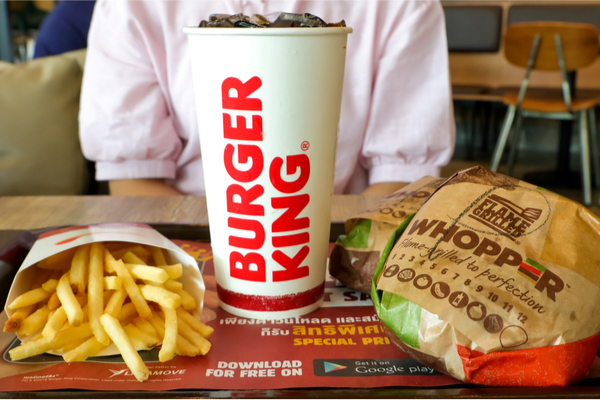Last week, four plaintiffs filed a class action lawsuit against Burger King, alleging that the fast food chain exaggerates the size of its burgers in its advertisements. The lawsuit, which was filed in U.S. District Court in Miami, is asking for damages for the plaintiffs and for anyone else who fell for the allegedly inflated burger pics, and bought a relatively undersized Burger King sandwich as a result. The legal filing also requests that Burger King swap out the photos in its ads for pictures that are closer to the patties’ real-life sizes.
According to the South Florida Sun-Sentinel, the lawsuit alleges that Burger King uses oversized and inaccurate pictures to advertise and illustrate all of its Whopper-branded sandwiches—including the meat-free Impossible Whopper and the new Whopper Melts—its Croissan’wich breakfast sandwiches, and its basic hamburger and cheeseburger.
The legal filing asserts that Burger King started to, let’s say, over-represent the size of its burgers in September 2017; the burgers and sandwiches that appeared in ads after September 2017 had increased in size by “approximately 35 percent” and the amount of meat depicted on the sandwiches had doubled. “Although the size of the Whopper increased materially in Burger King’s advertisements, the recipe or the amount of beef or ingredients contained in Burger King’s Whopper has never changed,” the lawsuit alleges.
The plaintiffs in the lawsuit look to represent any U.S.-based Burger King customer who bought a burger or other menu item based on the “false and misleading advertising” that Burger King allegedly used from September 1, 2017 onward. They are suing for breach of contract, negligent misrepresentation, and unjust enrichment, and are seeking damages, legal fees, a jury trial—and yeah, more accurate pictures of Burger King products.
“Burger King’s actions are especially concerning now that inflation, food and meat prices are very high and many consumers, especially lower income consumers, are struggling financially,” the lawsuit reads. “Burger King’s promise to consumers of a large portion of food with their purchase is also causing consumers to come to, or order from, Burger King and make purchases that they would not have otherwise made.”
In 2010, the United Kingdom’s Advertising Standards Authority (ASA) launched its own investigation into Burger King’s Tendercrisp Chicken Sandwich, after it received complaints that it looked bigger in a TV commercial than it did in real life. “‘We purchased three Tendercrisp chicken burgers and noted the thickness of the burgers, the quantity of additional fillings—such as salad,” the agency wrote. “The subsequent overall height of the product was considerably less than appeared in the ad.” That particular Tendercrisp commercial was ultimately banned from re-airing in the UK because the ASA deemed it “misleading.”
A spokesperson for the restaurant chain states, “Burger King does not comment on pending or potential litigations.”
—
Photo Credit: agencies / Shutterstock.com
